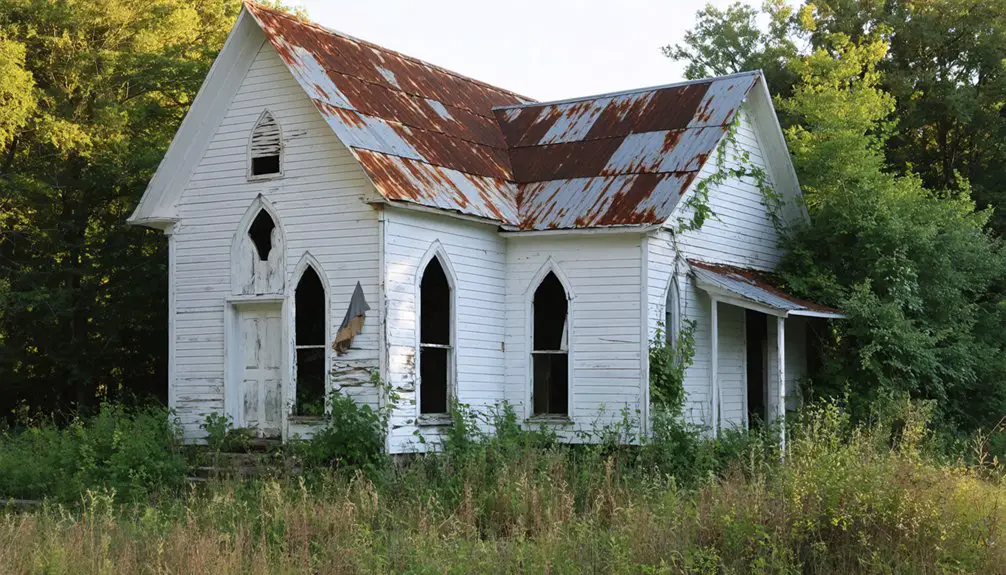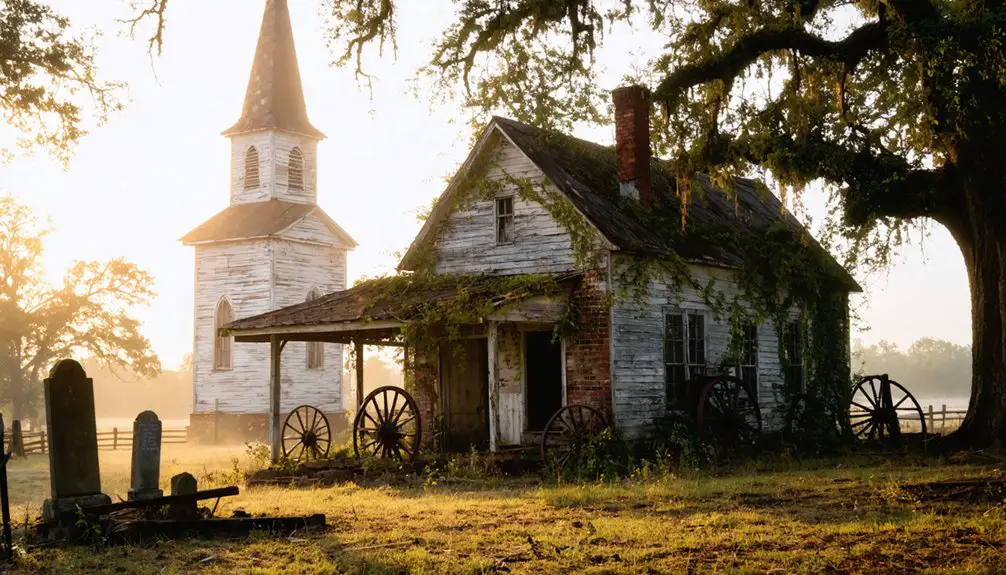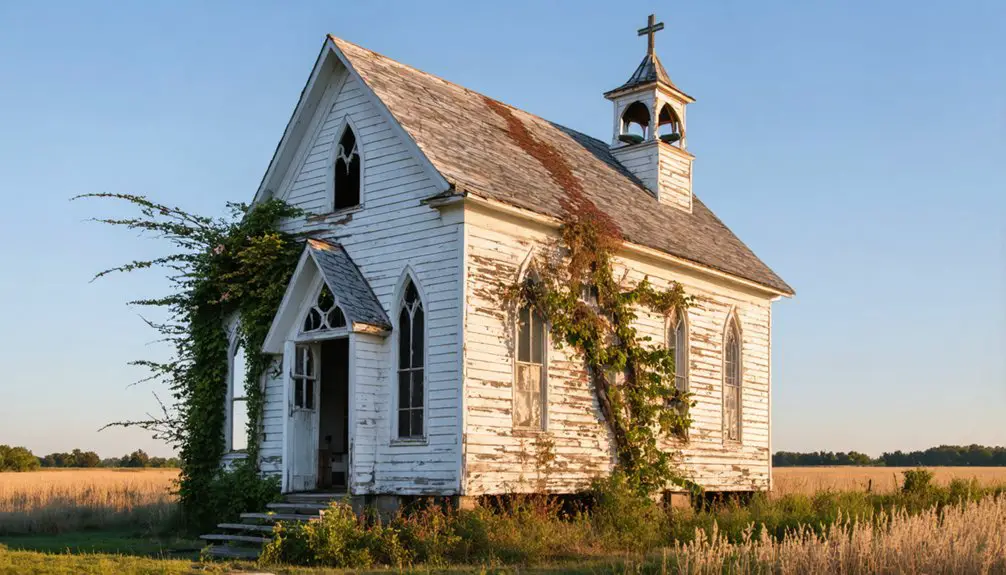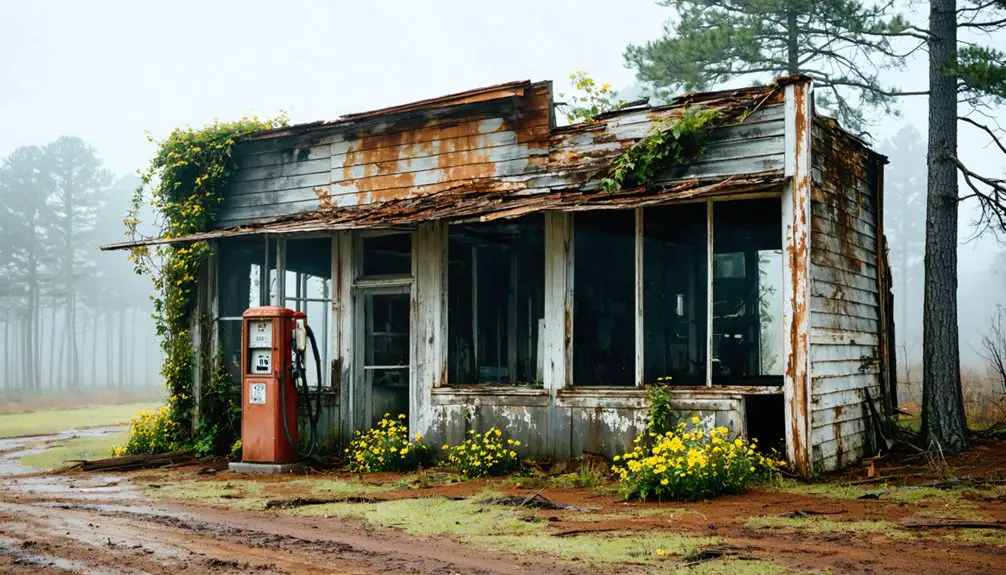You’ll find Westville’s ghostly remains in Simpson County, Mississippi, where it served as the original county seat from 1824 to 1906. This once-thriving town, established under the influence of Colonel Cato West, featured three successive courthouses and the prestigious Westville Academy. After losing its county seat status to Mendenhall, Westville faded into history. Today, only its historic cemetery remains, where weathered tombstones tell tales of the prominent families who shaped this forgotten community.
Key Takeaways
- Westville, established in 1824, served as Simpson County’s seat until 1900 before becoming a ghost town after losing government functions.
- The town’s decline began when the county seat moved to Mendenhall in 1900, leading to business closures and population exodus.
- Only a historic cemetery remains today, containing tombstones and grave markers that chronicle Westville’s former prominence.
- Three successive courthouses marked Westville’s importance, including an 1824 log cabin, though no grand buildings survive today.
- The site’s abandonment occurred after a seven-year political battle and 1906 election that permanently established Mendenhall as county seat.
A County Seat’s Rise to Prominence
When Westville was established in 1824, the town quickly emerged as Simpson County’s governmental center, earning its designation as county seat in 1827.
You’ll find that the town’s early community governance started humbly in a 20′ x 24′ log cabin that served as the first courthouse, before more substantial structures were built to meet the growing needs of the county.
The town’s historical significance grew after its incorporation in 1836, as it became the epicenter of legal proceedings and civic activities.
Following its 1836 incorporation, Westville emerged as the vital center of Simpson County’s legal and civic affairs.
Local newspapers like *The Westville News* kept citizens informed, while the courthouse drew merchants and residents who supported county functions.
The establishment of the Westville Academy in 1827 further solidified the town’s importance as an educational and cultural center.
Westville’s central location made it the natural hub for Simpson County’s settlement patterns and transportation routes throughout the 19th century.
The town’s close-knit community became a defining characteristic of life in Westville during its peak years.
The Legacy of Colonel Cato West
Colonel Cato West, who you’ll find served as Secretary and Acting Governor of the Mississippi Territory, left an indelible mark on Westville’s early development through his political leadership.
You’ll recognize his influence in the territorial government’s shift after the Louisiana Purchase, when he succeeded William C. C. Claiborne and corresponded directly with President Thomas Jefferson on significant territorial matters. Researchers can now trace his family lineage through historical records access on genealogy websites.
Your research into West’s legacy reveals his pivotal role at the 1817 Mississippi constitutional convention, where he helped shape the territory’s path to statehood while serving as one of the region’s most articulate political voices.
Contemporary historians recognize him as a strong intellectual athlete whose writing skills greatly influenced territorial governance.
Political Rise and Influence
Throughout Mississippi Territory’s formative years, Cato West emerged as a pivotal political figure who served as Secretary and acting governor from 1803 to 1805.
You’ll find his influence extended far beyond those official titles, as he masterfully built political alliances while overseeing territorial governance during a critical period following the Louisiana Purchase.
West’s power stemmed from his multiple roles – he commanded militia forces while maintaining extensive land holdings, giving him both military and economic authority. As a vocal opponent, he led the charge against Winthrop Sargent’s governorship through petitions and reform movements. His grandson Frank Montgomery would later serve in the Mississippi House of Representatives, continuing the family’s political legacy.
He worked directly with President Jefferson on territorial policy and proved instrumental in certifying elections and legislative appointments.
His persuasive writing skills and political advocacy made him especially effective during the 1817 constitutional convention, where he helped shape Mississippi’s evolution from territory to statehood.
Early Mississippi Leadership Role
As territorial secretary and acting governor, Cato West wielded significant authority in early Mississippi’s development through his combined military, judicial, and administrative roles.
You’ll find his military influence extended through his command of local militias while serving as Conservator of the Peace for the Northern District by 1798. His territorial governance reached its peak during 1803-1805 when he stepped in as acting governor after William C. C. Claiborne’s departure. He established deep roots in the region after moving his family to the Natchez District in 1782. His son Charles C. West would later become a prominent physician in the area, following in his father’s footsteps of community leadership.
- Maintained direct correspondence with President Thomas Jefferson on territorial matters
- Exercised both judicial and executive powers through appointed territorial offices
- Shaped administrative law while managing official records and correspondence
West’s marriage to Sarah Withers and his extensive land holdings cemented his position among the influential settler elite, establishing a legacy that would impact Mississippi for generations to come.
Life in 19th Century Westville
You’d find the Westville courthouse bustling with activity during court sessions, as farmers and townspeople gathered to conduct legal business, settle disputes, and witness trials.
County officials and clerks kept regular hours at the courthouse, maintaining records of land transactions, marriages, and other crucial documents that drew citizens from across Simpson County. The frame courthouse constructed in 1827 replaced an earlier log structure.
The courthouse steps and grounds served as natural gathering spots where you might hear locals sharing news, conducting informal business deals, or participating in political discussions and speeches.
Like other locations named Westville, this site required a clear distinction from similarly named places to prevent confusion among visitors and officials.
Daily Administrative Activities
Life in 19th century Westville centered around its bustling courthouse, where county officials managed daily administrative duties for nearly 70 years.
As a resident, you’d find local governance touching every aspect of your life, from property records to legal proceedings. The courthouse served as the heart of civic engagement, where your voice mattered in essential decisions about the town’s future.
- Election management and voting took place here, deciding everything from local officers to the county seat’s location.
- Legal disputes between neighbors and businesses were settled in the courthouse chambers.
- Your family’s important records – births, deaths, marriages, and land deeds – were carefully maintained by county clerks.
The courthouse remained Westville’s administrative center until 1901, when residents voted to move operations to the railroad town of Edna.
Social Gatherings Around Courthouse
Beyond its administrative role, the Westville courthouse served as the vibrant social heart of the community throughout the 19th century.
You’d find courthouse gatherings happening regularly, from militia musters to political rallies, public speeches to holiday celebrations. The courthouse square drew folks from surrounding rural areas, creating a natural meeting spot where you could trade goods, share news, or catch up with neighbors.
During court days, you’d see traveling merchants setting up shop alongside local craftsmen, while community interactions flourished as people gathered for religious meetings, storytelling sessions, and seasonal festivals.
Even after fires repeatedly damaged the building, your ancestors would quickly rebuild, understanding the courthouse’s essential role in maintaining Westville’s social fabric – until the county seat’s eventual move to Mendenhall ended this cherished tradition.
Tales From the Courthouse Square
While courthouse squares across Mississippi shared similar layouts and functions, Westville’s square held particular significance as the heart of Simpson County’s early government and social life.
You’ll find courthouse legends woven through its history, from the mysterious burning of the 1844 framed courthouse to the seven-year political battle over moving the county seat to Mendenhall. Ghost stories still echo from the old square, where three successive courthouses met fiery ends.
- William Gibson’s original log cabin courthouse served as the first seat of justice
- The Masonic Lodge temporarily occupied the old courthouse during the shift period
- Local political speeches and celebrations drew crowds to the square until its decline
As you explore Westville’s past, you’ll discover how this once-vibrant square shaped Simpson County’s early development.
Decline and Abandonment

The fate of Westville shifted dramatically in 1900 when Simpson County officials moved the seat of government to Mendenhall.
Though a brief legal victory in 1905 returned the courthouse to Westville, your ancestors witnessed its final departure following a decisive 1906 special election where Mendenhall secured 937 votes.
You’ll find the economic impacts were swift and devastating.
Businesses shuttered their doors as government functions and commerce shifted away from the once-thriving town square.
The brick courthouse that had served as the community’s heartbeat fell silent, and families who’d called Westville home for generations began moving away.
Today, if you visit this ghost town, you’ll discover little more than the historic cemetery and overgrown plots where proud buildings once stood, serving as silent witnesses to Westville’s vanished glory.
Echoes in the Cemetery
Standing sentinel among overgrown grasses, Westville’s historic cemetery remains a poignant chronicle of the town’s bygone era.
Local folklore speaks of ghostly whispers carried on the wind through weathered tombstones, drawing both paranormal enthusiasts and history buffs to this sacred ground.
- Gravestone inscriptions reveal crucial genealogical data linking current Simpson County families to their 19th-century roots.
- Cemetery lore tells of unexplained sounds echoing near the markers, especially at dusk.
- The site’s isolation and abandoned status fuel stories of spectral encounters among the historic graves.
You’ll find tangible connections to Westville’s past through the varied tombstones – from simple fieldstones to elaborate markers – each telling the story of the community that once thrived here before the town’s decline in 1906.
Architectural Remnants and Lost Heritage
Beyond the somber cemetery grounds lies a deeper story of Westville’s architectural legacy, now largely lost to time.
You’ll find no grand buildings standing today where this once-proud county seat flourished. The town’s architectural significance began with its 1827 courthouse – a humble log cabin that fell victim to fire, like many frontier-era structures.
Though later rebuilt in brick, even this more durable courthouse couldn’t escape destruction.
As you walk these grounds today, you’re treading where three successive courthouses once stood, each marking an era of Westville’s prominence.
The town’s heritage preservation efforts came too late – when the county seat moved to Mendenhall in 1900, Westville’s remaining structures gradually succumbed to neglect and time, leaving only scattered foundations beneath the rural landscape.
Preserving Westville’s Memory
While Westville’s physical structures have vanished, dedicated preservation efforts keep the town’s legacy alive through various initiatives.
Through community storytelling and local documentation projects, families share their ancestral connections to this once-thriving settlement. Local preservation initiatives focus on collecting and digitizing historical records, photographs, and oral histories from descendants of Westville’s original inhabitants.
- Regional heritage festivals celebrate Westville’s cultural legacy, drawing visitors and keeping traditions alive
- Local historical societies maintain archives of maps, deeds, and family records tied to Westville
- Volunteer groups organize regular cemetery maintenance, preserving the final resting places of Westville’s pioneers
You’ll find that these preservation efforts aren’t just about protecting the past – they’re about maintaining your connection to a crucial piece of Mississippi’s heritage that shaped countless family histories.
Frequently Asked Questions
Are There Any Paranormal Activities Reported in Westville’s Abandoned Buildings?
You won’t find documented ghost sightings or haunted locations in these buildings, though similar Mississippi ghost towns report paranormal activity. Without residents around, there’s little evidence of supernatural occurrences.
What Natural Disasters, Besides Fires, Contributed to Westville’s Decline?
Like a relentless tide, floods repeatedly battered the region’s foundations, causing devastating flood damage that accelerated economic decline. You’d have seen disease outbreaks and environmental challenges compound these natural hardships.
How Accessible Is Westville to Visitors Today?
You’ll find limited visitor accommodations and unmarked travel routes. You’ll need a private vehicle and GPS coordinates to navigate rural roads, as there’s no formal tourism infrastructure or public facilities.
Were There Any Notable Civil War Events in Westville?
Like shadows in time’s mist, you won’t find major Civil War battles in Westville itself, though you’ll discover it felt war’s touch through nearby skirmishes and troop movements around the Battle of Iuka.
What Native American Tribes Originally Inhabited the Westville Area?
You’ll find the Natchez, Chickasaw, and Choctaw tribes sharing this region’s tribal history, with the Natchez being most prominent locally, leaving their rich cultural heritage through temple-building and sun worship traditions.
References
- https://www.loquis.com/en/loquis/6536595/Westville+Simpson+County+Mississippi
- https://mississippifolklife.org/articles/haunted-by-a-ghost-town-the-lure-of-rodney-mississippi
- https://kids.kiddle.co/Westville
- https://www.youtube.com/watch?v=z7pw1Q-9s_E
- https://www.instagram.com/p/DGonEC3ulg0/?hl=en
- https://mageenews.com/simpson-county-roads-the-westville-cemetery-by-andy-baeuerle/
- https://storymaps.arcgis.com/stories/0dd42c39ab074ffbadeb3827cb42f914
- https://en.wikipedia.org/wiki/Cato_West
- https://ancestors.familysearch.org/en/LZ88-FQ6/cato-west-1750-1819
- https://www.feindholloway.com/west/cw1759.html



